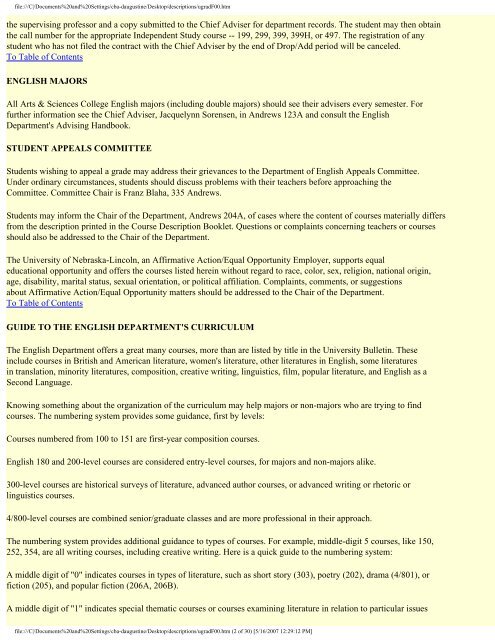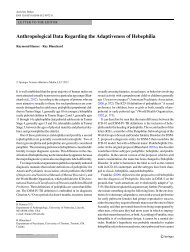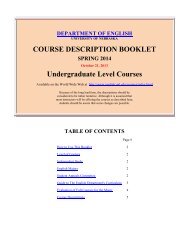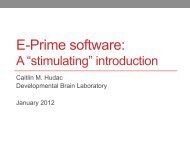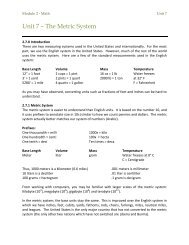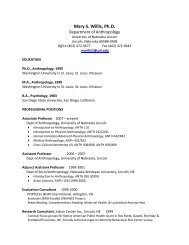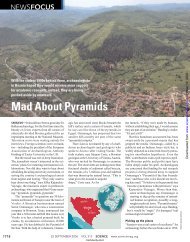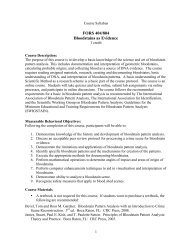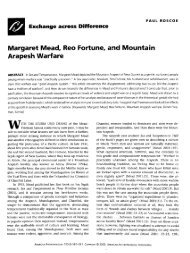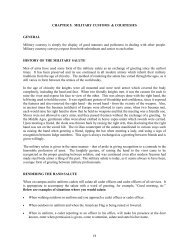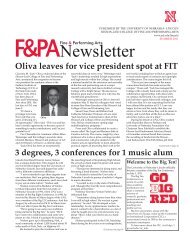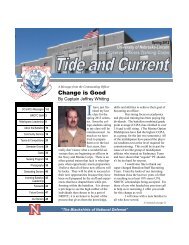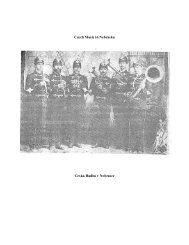Fall 2000 - The University of Nebraska–Lincoln
Fall 2000 - The University of Nebraska–Lincoln
Fall 2000 - The University of Nebraska–Lincoln
Create successful ePaper yourself
Turn your PDF publications into a flip-book with our unique Google optimized e-Paper software.
file:///C|/Documents%20and%20Settings/cba-daugustine/Desktop/descriptions/ugradF00.htm<br />
the supervising pr<strong>of</strong>essor and a copy submitted to the Chief Adviser for department records. <strong>The</strong> student may then obtain<br />
the call number for the appropriate Independent Study course -- 199, 299, 399, 399H, or 497. <strong>The</strong> registration <strong>of</strong> any<br />
student who has not filed the contract with the Chief Adviser by the end <strong>of</strong> Drop/Add period will be canceled.<br />
To Table <strong>of</strong> Contents<br />
ENGLISH MAJORS<br />
All Arts & Sciences College English majors (including double majors) should see their advisers every semester. For<br />
further information see the Chief Adviser, Jacquelynn Sorensen, in Andrews 123A and consult the English<br />
Department's Advising Handbook.<br />
STUDENT APPEALS COMMITTEE<br />
Students wishing to appeal a grade may address their grievances to the Department <strong>of</strong> English Appeals Committee.<br />
Under ordinary circumstances, students should discuss problems with their teachers before approaching the<br />
Committee. Committee Chair is Franz Blaha, 335 Andrews.<br />
Students may inform the Chair <strong>of</strong> the Department, Andrews 204A, <strong>of</strong> cases where the content <strong>of</strong> courses materially differs<br />
from the description printed in the Course Description Booklet. Questions or complaints concerning teachers or courses<br />
should also be addressed to the Chair <strong>of</strong> the Department.<br />
<strong>The</strong> <strong>University</strong> <strong>of</strong> Nebraska-Lincoln, an Affirmative Action/Equal Opportunity Employer, supports equal<br />
educational opportunity and <strong>of</strong>fers the courses listed herein without regard to race, color, sex, religion, national origin,<br />
age, disability, marital status, sexual orientation, or political affiliation. Complaints, comments, or suggestions<br />
about Affirmative Action/Equal Opportunity matters should be addressed to the Chair <strong>of</strong> the Department.<br />
To Table <strong>of</strong> Contents<br />
GUIDE TO THE ENGLISH DEPARTMENT'S CURRICULUM<br />
<strong>The</strong> English Department <strong>of</strong>fers a great many courses, more than are listed by title in the <strong>University</strong> Bulletin. <strong>The</strong>se<br />
include courses in British and American literature, women's literature, other literatures in English, some literatures<br />
in translation, minority literatures, composition, creative writing, linguistics, film, popular literature, and English as a<br />
Second Language.<br />
Knowing something about the organization <strong>of</strong> the curriculum may help majors or non-majors who are trying to find<br />
courses. <strong>The</strong> numbering system provides some guidance, first by levels:<br />
Courses numbered from 100 to 151 are first-year composition courses.<br />
English 180 and 200-level courses are considered entry-level courses, for majors and non-majors alike.<br />
300-level courses are historical surveys <strong>of</strong> literature, advanced author courses, or advanced writing or rhetoric or<br />
linguistics courses.<br />
4/800-level courses are combined senior/graduate classes and are more pr<strong>of</strong>essional in their approach.<br />
<strong>The</strong> numbering system provides additional guidance to types <strong>of</strong> courses. For example, middle-digit 5 courses, like 150,<br />
252, 354, are all writing courses, including creative writing. Here is a quick guide to the numbering system:<br />
A middle digit <strong>of</strong> "0" indicates courses in types <strong>of</strong> literature, such as short story (303), poetry (202), drama (4/801), or<br />
fiction (205), and popular fiction (206A, 206B).<br />
A middle digit <strong>of</strong> "1" indicates special thematic courses or courses examining literature in relation to particular issues<br />
file:///C|/Documents%20and%20Settings/cba-daugustine/Desktop/descriptions/ugradF00.htm (2 <strong>of</strong> 30) [5/16/2007 12:29:12 PM]


